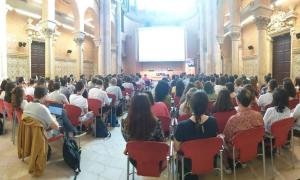IrsiCaixa at the workshop “Breaking through the emergent immunotherapy and immune targets in cancer”

Researchers from IrsiCaixa discussed where are we and where are we going in the field of immunotherapy at the workshop organized by FLScience
More and more scientists are starting to be interested in Immunology since it is a really transversal field and can affect different research lines, from HIV to cancer. Last Thursday, September 26th, researchers from IrsiCaixa joined the workshop “Breaking through the emergent immunotherapy and immune targets in cancer”. This workshop brought together academic leaders to discuss the latest advances and opportunities in immuno-oncology.
Jorge Carrillo, Leticia De Mattos and Julià Blanco, researchers from IrsiCaixa, assisted the workshop and talked about their research fields and their interests in the world of immuno-oncology.
Jorge Carrillo, associate researcher of the Virology and Cellular Immunology group at IrsiCaixa, put in context the relationship between cancer and the immune system (IS). Carrillo explained that our body protects us from cancer, but cancerous cells can reach a point in which they manage to stop the activity of the immune system or hide from the immune cells. At this point, cancer cells start growing and immune system can’t stop them. Immunotherapy aims to activate the immune system and/or avoid the immunosuppression activity of cancer cells. Carrillo believes that in order to improve immunotherapy, we need a better understanding of the mechanisms used by cancer cells to supress the activity of the immune system. Carrillo also points out that immunotherapy should be personalized depending on the environment in which the tumour resides.
Leticia De Mattos recently joined IrsiCaixa with a strong knowledge on tumour-specific proteins, called neoantigens. Those proteins are the product of mutations that are only present in cancer cells. During the workshop, De Mattos exposed different tools used to identify neoantigens. There is a big interest in finding neoantigens since they are recognized as foreign proteins and they are able to activate the immune system. However, there are few molecules so specific to tumour cells and finding those is quite difficult, De Mattos emphasized the need to optimize the identification process. That is one of the current interests of the Neoantigens and Therapeutic Vaccines for Cancer group, headed by De Mattos at IrsiCaixa.
Afterwards, Julià Blanco, leader of the Virology and Cellular Immunology group at IrsiCaixa, talked about Virus Like Particles (VLPs), which are synthetic particles that mimic the structure of a virus but have no infectious capacity. Those particles activate our immune system and that’s why Blanco’s group is studying the possibility to use for the HIV vaccine. During the workshop, Blanco focused on cancer and how vaccines can be used to activate the immune system, enabling the elimination of cancer cells.
Find enclosed a tweet with the highlights of De Mattos talk and other interactions
The conclusions of @demattosarruda on her talk:
- Neoantigens (mutated non-self tumor-specific antigens) elicit a developed response by the immune system.
- Immunogenic neoantigens are few.
- Predictions for neoepitopes need further improvement.#ImmunotherapiesInCancer pic.twitter.com/Ti1vqQxcJY— FLS Science (@FLSscience) September 26, 2019
Fantastic event at #immunotherapiesincancer today, the quality of the science was astonishing, I'm so excited about the future of immunotherapy and its potential impact in patients... thanks @FLSscience for making it happen @IrsiCaixa @FLSida @IIBSantPau @demattosarruda pic.twitter.com/INujLGu6eV
— Luis Pareras MD, PhD (@pareras) September 26, 2019